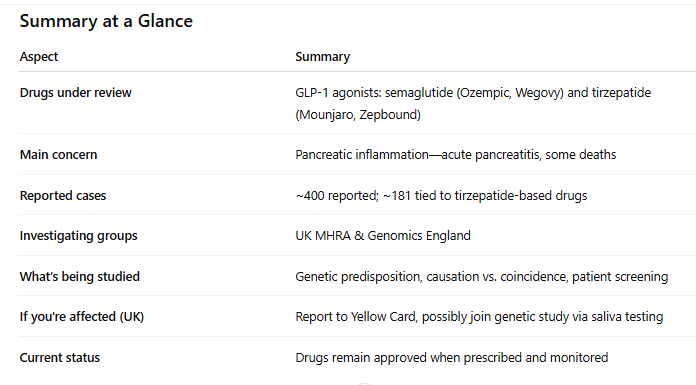A New Investigation Says Maybe
🚨 What’s Happening?
Recently, UK health authorities have launched an investigation into the safety of widely used weight-loss medications such as Ozempic (semaglutide) and Zepbound (tirzepatide). Hundreds of reports indicate that some individuals experienced serious pancreatic conditions—raising new safety questions about these drugs.
Background: Why These Meds Are So Common
These medications belong to a group called GLP‑1 receptor agonists, which mimic the natural hormone GLP‑1 in your body. That hormone regulates blood sugar levels and curbs appetite—making these drugs popular for both diabetes and obesity treatments.
- Semaglutide-based drugs include Ozempic and Wegovy.
- Tirzepatide-based drugs (like Zepbound and Mounjaro) have a dual action—they also engage GIP receptors for an added metabolic boost.
What Exactly Is Being Reported?
- Dozens of individuals have reported acute or chronic pancreatitis, a painful inflammation of the pancreas.
- Up to 10 fatalities may be linked to these reactions, though investigations are ongoing.
- Around 400 suspected cases involve GLP‑1 drugs, with nearly 181 tied to the tirzepatide-based medication, Mounjaro (since semaglutide- and tirzepatide-based drugs are both in use).
Related: Discover A Hidden Root Cause Of Stubborn Belly Fat. More HERE
What Are Authorities Investigating?
- Possible Genetic Links: Are certain individuals genetically predisposed to harmful pancreatic effects from these drugs?
- Real vs. Coincidental Cases: With millions using these meds, some unrelated health issues will inevitably occur—so causation must be clearly established.
- Regulatory Oversight: The UK’s Medicines and Healthcare products Regulatory Agency (MHRA) and Genomics England are jointly conducting the investigation.

Why Regulation Still Approves These Medications
- These drugs remain approved for medical use when prescribed and monitored by doctors.
- There is no firm evidence linking the medications directly to pancreatic damage in most users.
- Known side effects are already documented—pancreatitis was not considered a common one.
- The key risk comes from unsupervised or unofficial purchasing, which can bypass medical safeguards.
Who Should Report What—If You Live in the UK
UK adults (age 18+) who believe they experienced a strong negative reaction to any of these medications—especially Ozempic, Wegovy, Mounjaro, Zepbound, or liraglutide—are being urged to:
- Register on the Yellow Card scheme (the UK’s official adverse drug-reporting site).
- Submit additional details if selected—including possibly providing a saliva sample for genetic analysis through Genomics England.
- Detail symptoms such as persistent severe abdominal pain, which can be the hallmark of pancreatitis.
Putting Risk in Context
- When many people take a medication, rare adverse reactions can still occur even if unrelated to the drug.
- Health outcomes depend on many variables: existing medical conditions, genetics, age, and sex.
- Experts like Genomics England’s Matt Brown suggest that many reactions may be genetically driven—and that biology-based screening might help reduce risks in the future .
What to Do if You’re Taking These Drugs
- Consult your healthcare provider—do not stop your medication without medical advice.
- Monitor for signs of pancreatitis: persistent upper abdominal pain, nausea, vomiting, or fever.
- Avoid purchasing through non-medical channels like the internet or unverified sellers.
- Ensure any use is under professional medical supervision and includes appropriate monitoring.
What’s Next?
- The MHRA and Genomics England’s findings may lead to updated usage guidelines, safety warnings, or even screening protocols for high-risk patients.
- If genetics play a confirmed role, future prescriptions may include preliminary genetic testing to flag susceptible individuals.
- Global regulators may be watching closely—what happens in the UK could influence policies internationally.

Related: Discover A Hidden Root Cause Of Stubborn Belly Fat. More HERE
Final Word
These medications continue to be powerful tools for managing weight and diabetes when used appropriately. Nonetheless, the rising number of pancreatic-related reports—especially severe cases and a handful of fatalities—deserve thorough scientific scrutiny. As the UK investigation evolves, the findings may change how these medications are prescribed, and pave the way for safer, more personalized treatment in the future.
If you’re using or considering one of these drugs, always follow your physician’s guidance—and speak up if you experience troubling symptoms.
